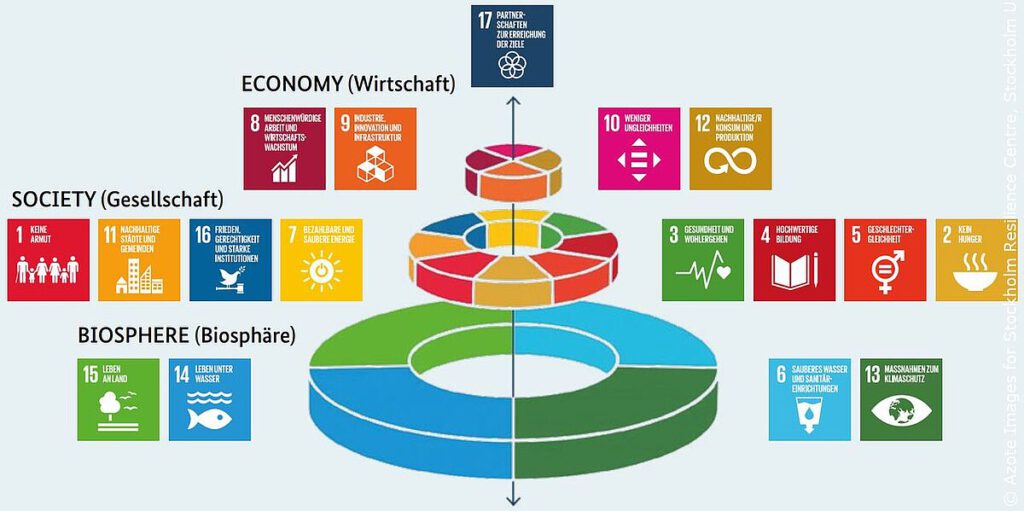Sus|tain|a|bi|li|ty?
The German Duden describes (as of 03/2023) two meanings:
- A long-lasting effect
- A principle according to which no more may be consumed than can grow back, regenerate, be made available again in the future.
Both meanings play a major role for VNU, as long-term strategies and concepts for protecting and shaping our environment want to be found and implemented.
 In 1992, at the World Conference on Environment and Development in Rio de Janeiro, the international community formulated the first guiding principle of sustainable development. This included the obligation to limit the social gap between industrialised and developing countries as well as to protect the natural resources and led to the "Agenda 21", the action programme for the 21st century.
In 1992, at the World Conference on Environment and Development in Rio de Janeiro, the international community formulated the first guiding principle of sustainable development. This included the obligation to limit the social gap between industrialised and developing countries as well as to protect the natural resources and led to the "Agenda 21", the action programme for the 21st century.
From 2010 onwards, the United Nations launched a global development agenda, which was initially set out in ten Millennium Development Goals (MDGs) and ultimately resulted in the 17 Global Goals for Sustainable Development on 25 September 2015. Accompanied by the 2030 Agenda for Sustainable Development, the SDGs were adopted by heads of state and government of 193 states and are committed to fighting hunger and poverty, promoting affordable and clean energy, actively protecting the climate or creating the conditions for liveable, sustainable cities. The basis is a balance of the social, ecological and economic dimensions, formulates a total of 169 sub-goals and addresses all actors (politics, economy and society) equally.

Further reading?
Sustainability at Department of Economic and Social Affairs of United Nations
https://sdgs.un.org/goals
Die German Sustainable Development Strategy
https://www.bmuv.de/themen/nachhaltigkeit-digitalisierung/nachhaltigkeit/strategie-und-umsetzung/deutsche-nachhaltigkeitsstrategie
What is sustainability management?
Sustainability management comprises the integration of concepts and instruments for the improvement of social, ecological and economic aspects of companies and organisations. Sustainability management enables an organisation to systematically and regularly analyse and improve social, ecological and economic aspects. The objective is to contribute to the sustainable development of the organisation and to secure and increase the competitiveness of organisations.
Sustainability management thus goes beyond sustainability reporting. Similar to environmental protection and occupational safety management systems, sustainability management also includes the planning, the controlling and the monitoring the impact of the organisation and of its activities. Sustainability management also addresses issues of corporate social responsibility, business ethics and corporate ethics, and which values play a role in the organisation.
What standards are there?
There is no single standard for sustainability management. Organisations apply the following standards to various areas of sustainability management:
ISO 26000 - Guidance to social responsibility
This international standard sees itself as a guideline for sustainability in organisations. However, it does not contain any specific requirements, in particular for a management system, such as ISO 14001 or ISO 45001. For this reason, ISO 26000 is also not considered as a certifiable standard.
Global Reporting Initiative (GRI)
The Global Reporting Initiative develops and publishes a reporting standard to improve the transparency of organisations' sustainability performance. The standard therefore only covers a partial aspect of sustainability management and is therefore not directly to be considered a standard for sustainability management.
Deutscher Nachhaltigkeitskodex (DNK)
Like GRI, the German Sustainability Code is a reporting standard and cannot therefore be regarded directly as a standard for sustainability management.
Can a sustainability management system be certified?
In Germany, there is currently no standard for the certification of a sustainability management system in the accredited field. Bodies that issue certificates for sustainability management therefore do so without being accredited and monitored and do not enjoy the same credibility and recognition as accredited certification bodies. The same applies to the respective certificates.

